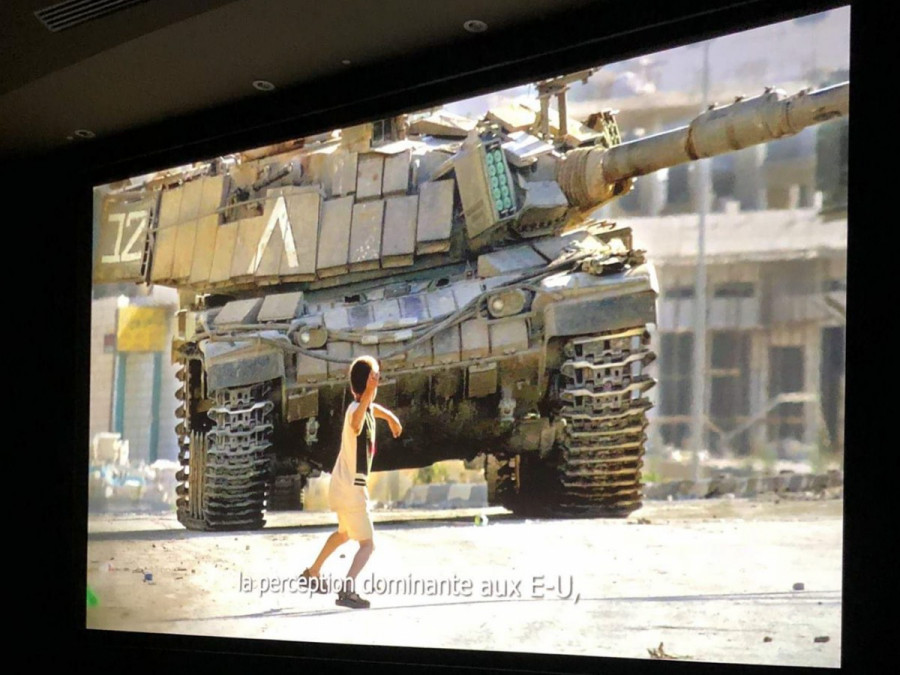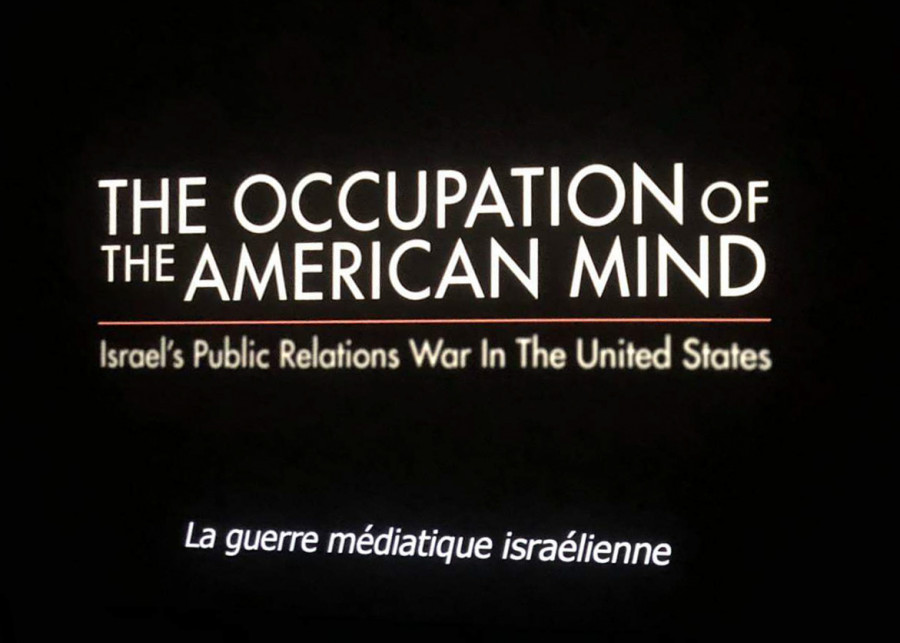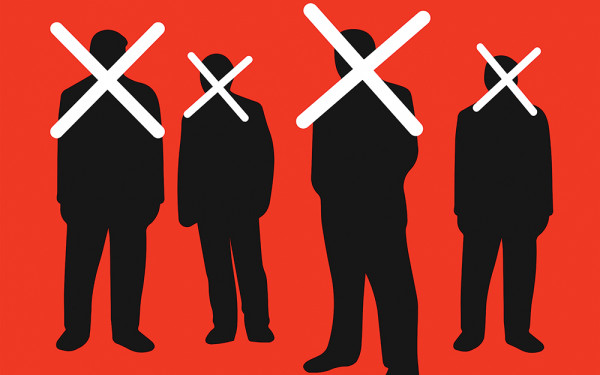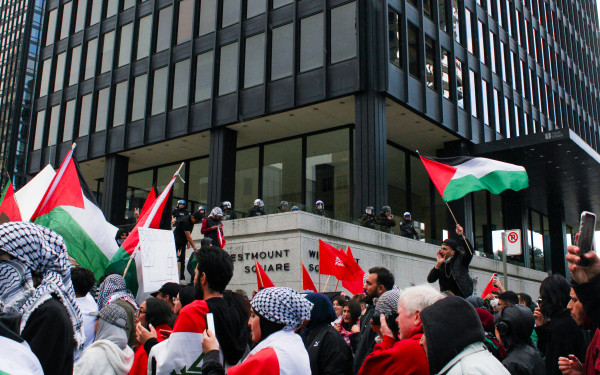Film review: “The Occupation of the American Mind”
A Critical Look into the Israeli-Palestinian Conflict— Which is Censored In The U.S.
The documentary Occupation of the American Mind showcases the propaganda distributed of the Israeli-Palestinian conflict, and urges people to notice the dehumanizing of the Palestinian peoples in media coverage.
On 23 Nov. 2018, Solidarity for Palestinian Human Rights Concordia screened Loretta Alper and Jeremy Earp’s 2016 documentary, which sheds light on the issue; one of the biggest disputes in the Middle-East.
In a battle for self-determination, Jewish zionist forces came together to claim a land they can call their own, setting their sights on the country then called Palestine. Zionists then laid claim to Jerusalem, the holiest city in Judaism; as it is considered to be the spiritual and ancestral homeland of the Jewish peoples. In 1947 the land was called Palestine. In 1948, it became a battlefield, a ‘nakba,’ as the Palestinians call it, which translates to ‘catastrophe.’ In 2018, the main land is now called Israel, with sparse Palestinian neighbours.
The roots of this conflict are often times conflicted by both parties. Palestinians see it as premeditated cleansing of the Arab population, in order for Jewish people to reclaim the Jewish state of Israel. Israelis on the other hand, believe it to be consequences of unfortunate wartime accidents in their fight for self-determination. In 1948, 700,000 Palestinians were uprooted from their homes, creating one of the biggest refugee crisis of today. To this day, Palestinians are striving to reclaim their right of return to their home of Palestine, while Israel believes the land is rightfully theirs.
Politically, it’s a never-ending debate over two-states solutions and the right to a homeland. Whose homeland, they wonder? It is a bountiful confusion of religion and politics.
It is a mess.
The Occupation of the American Mind dizzyingly showed that the media is the biggest culprit in spreading different discourses and biases of the conflict. Flashing shots of news segments pushed forward this dialogue. If you turn on CNN, Israel is defending itself against Palestinian terrorism. Israelis are undergoing constant bombings for simply living in their promised land. If you turn on the BBC, countless debates are led to understand the 70-year-long conflict. If you turn on Al-Jazeera, zionism is a heinous plague and Israel is an apartheid state.
Informative, gripping, and not without controversy, Alper and Earp’s documentary is a much needed wakeup call.
Narrated by Pink Floyd frontman and fierce Palestinian rights’ advocate Roger Waters, The Occupation of the American Mind recounts the events that have led to North Americans’ duality concerning the apparent war in Palestine. The cast includes Sut Jhally, Yousef Munayyer, Noam Chomsky, Rula Jebrael, Rami George Khouri and others discussing the events leading up to the world’s current situation in the Israeli-Palestinian conflict. The audience is shown the demographic change of Israel from 44 per cent Palestinian territory, 56 per cent Israeli in 1967, to about 75 per cent Israeli and 20 per cent Palestinian at the end of 2017. The documentary states that numbers are changing with each passing day.
The documentary also showcases the hostility among Americans when the state of Israel is critiqued in any way. One is immediately branded as being an anti-semite. Some go as far as attacking Jewish people who protest against Israel, and accuse them of being ‘self-hating jews.’
The Occupation of the American Mind is thorough in its research and follow-through of historical events leading to this political clash. Analyzing the state of Israel’s grip on American minds, it displays decades of zionism propaganda and warfare.
Soon after the screening, SPHR conducted a Skype interview with Sut Jhally about the documentary.
“[You must] insist on the humanity of the Palestinians, and that within this propaganda campaign, the Palestinians’ humanity has been lost. […] We’re not asking for special treatment of Palestinians, we’re asking for them to be recognized as humans and have the same rights as all human beings, and that the declaration of human rights should apply to them as it applies to everyone else.”— Sut Jhally
Jhally, a communications professor at the University of Massachusetts is also an author and activist. He is the founder of the Media Education Foundation, an organization that focuses on redirecting the masses to films that inspire critical reflection on the social, political, and cultural impact of mass media in the States.
What can students do for the cause?
First, Jhally said that you must make propaganda clear to the public.
“It’s very hard to give a counter narrative, but one thing you can do is start to take the narrative apart and to make yours clear,” Jhally said. “Make people pay attention to the propaganda, cause once it’s clear that it’s propaganda, it stops working.”
He then explained that discursive, non-violent tools can be introduced to stand by the Palestinian cause, like the Boycott, Divestment, Sanctions movement; an initiative whose aims to end international support for Israel’s oppression of Palestinians and to pressure Israel to comply with international law.
Furthermore, Jhally states that it is important to look beyond all these political stances, and ideologies, in order to focus on what is truly important.
“[You must] insist on the humanity of the Palestinians, and that within this propaganda campaign, the Palestinians’ humanity has been lost,” he said. “[…] We’re not asking for special treatment of Palestinians, we’re asking for them to be recognized as humans and have the same rights as all human beings, and that the declaration of human rights should apply to them as it applies to everyone else.”
“Focus on Palestinians who have been made invisible,” Jhally continued, “and when they are not made invisible, they are portrayed through a terrorist and violent lens. ”
Zahia El Masri, who is part of the Canadian Palestinian Foundation of Quebec, was also present at the screening. As a Palestinian refugee herself, she was invited to share her thoughts.
“I always emphasize this point [being a refugee] because this is what it’s all about,” she said. “I mean, yes, there is BDS, yes, there is propaganda, but in the end it’s about human life. It’s about the Palestinians living the ongoing nakba [catastrophe]. This is what we always have to go back to, and that is solidarity for Palestinian human rights.”
She also went on to say that the recognition of human rights violations is universal, and applicable in many countries; including right here in Canada, where the rights of Indigenous peoples have also been ignored.
Back in 2016, The Occupation of the American Mind experienced a great deal of censorship in North America, unsurprisingly in the United States.
“We didn’t have obstacles in the making of the documentary,” Jhally said, “the obstacles were in the distribution of it. The obstacles were in getting it seen, especially in the U.S. which is as important as the obstacles you face in the production.”
However, it has now been made accessible to the general public online.
“It’s been shown on Al-Jazeera, Russia Today, it’s had a few screenings in Mexico City, London, and Beirut. In the U.S. it was very, very difficult to get any kind of media coverage for it. So what we’ve done is we decided to make the movie available for free online, to get past the blockade.”
To access the documentary film, you can view it at www.occupationmovie.org.








